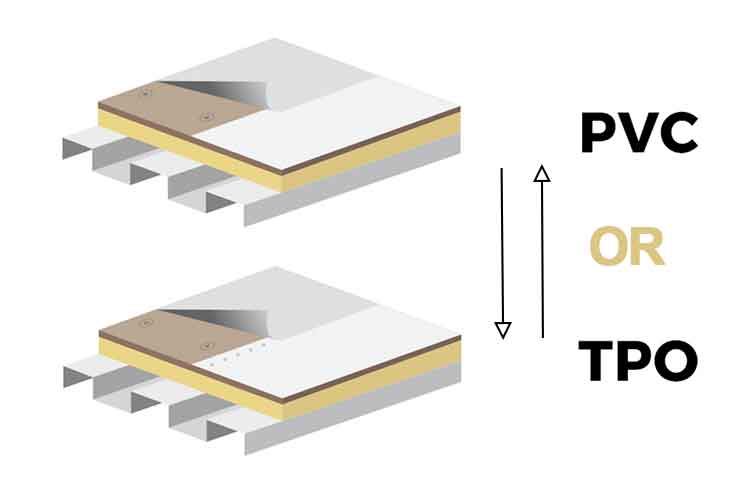
Polyvinyl Chloride (PVC) and Thermoplastic Polyolefin (TPO) are the ideal roofing options for low slope or flat roofs. This Huntsville roofing type is suited for wet locations where water tends to accumulate on the roof.
Here we will compare the two roofing options so that you can select the right roof for your house.
PVC vs. TPO Roofing: Which is a Better Option?
PVC and TPO roofing types are best for flat or low slopes. The roofing material is best for both residential and commercial premises.
PVC is an older roofing material that has been around since the 1960s. In contrast, TPO is a newer material that has been in use since the early 1990s. The latter boasts of a more improved single-ply material.
A great thing about the roofing materials is that they both have a high reflective capacity. These can reflect up 91 percent of the rays of the sun. The result will be cooler temperatures during summers. It will result in reduced need for air conditioners thereby saving you energy bills.
Now that you know the similarities of PVC and TPO materials, let’s look at the differentiating factors so that you select the right material for your house.
Weather Resistance
TPO is more weather resistant as compared to PVC roofing material. The former has greater heat aging properties as compared to the latter. In addition, accelerated weathering tests show that TPO is more durable as compared to PVC roofing material.
Chemical Resistance
TPO roofing material may have better weather resistance but its chemical resistance is lower as compared to PVC. As a result, PVC is a preferred roofing material in restaurants and eateries where food is cooked.
Durability
PVC material is more durable as compared to TPO. The former has been around for much longer. Manufacturers have greatly improved the formulations over time. You can expect the roof to last for 20 years or more. In contrast, TPO material generally doesn’t last for more than 10 years.
A con with PVC material is that the material does not perform well in colder climates. The roofing material becomes brittle when exposed to extreme cold temperatures. So, the material is not recommended in areas where the temperature goes below freezing during winters.
Fire Resistance
PVC material is more fire resistant as compared to TPO. The roofing material has a low combustion. It is difficult to ignite and burns slowly. Flames can be extinguished easily by removing the source. In contrast, TPO materials do not have a high fire resistance rating.
Price
Price is a significant factor when selecting a roofing material. PVC roofing material cost much higher than TPO. But the long term cost of PVC is lower since the roofing material lasts twice as long resulting in cost savings.
Environmental Friendliness
PVC and TPO roofing materials are both eco-friendly and recyclable. The roofing materials can reflect a high percentage of heat. This result in reduced heat island effects with associated environmental benefits.
Another benefit of PVC and TPO is that they are recyclable. Old material can be used in the manufacturing of new material. The result is reduced carbon footprint on the environment.
Installation and Repairs
Installation of PVC and TPO is similar. They are easier to install than shingles. But unlike traditional roofing materials, these cannot be repaired. You will have to replace the material completely if damaged due to a storm.
Maintenance
Maintenance of both PVC and TPO is easy. They are resistant to mold formation. Moreover, the materials are more resistant to punctures and impact damage than traditional shingle roofing material.
Final Remarks
PVC has better weather resistance properties. The material can last for longer than TPO material. You should hire a professional Huntsville roofing contractor for installation. Make sure the contractor holds a valid license and permit for installation of roofing material in your Huntsville, AL.

